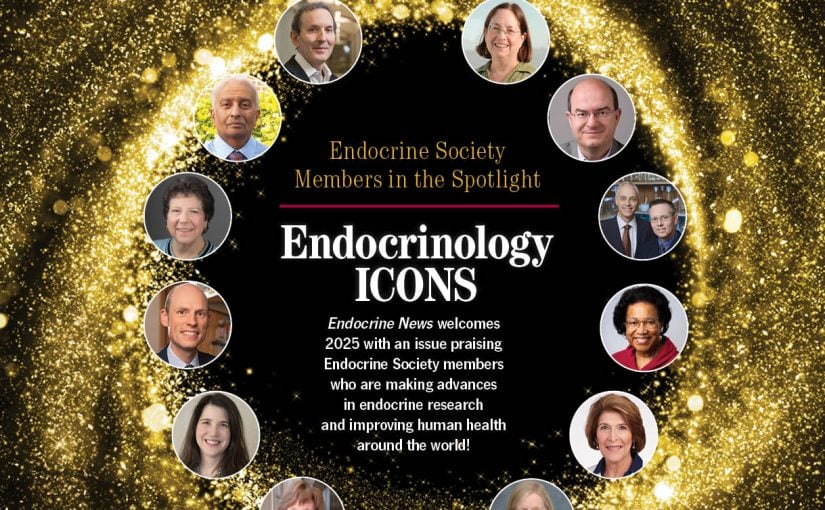The Endocrine Society welcomes its 2012–2013 president, William F. Young, Jr. M.D., M.Sc., who took office on June 26. A full-time clinician, he succeeds physician-scientist Janet E. Hall, M.D., in accordance with the Society’s rotation of presidents who represent its primary constituencies: basic researchers, clinical researchers, and clinical practitioners. Young is a professor of medicine and chair of the Division of Endocrinology, Metabolism, and Nutrition at the Mayo Clinic College of Medicine in Rochester, Minnesota. Having delivered hundreds of oral presentations at national and international meetings and written 177 articles, 62 book chapters, and numerous abstracts, his presentation and publication record is extensive.
Young’s involvement with the Society goes back to 1985, when he joined the membership after completing his clinical endocrinology fellowship at Mayo Clinic. He has served on numerous committees, co-chaired the Annual Meeting Steering Committee in 2002 to 2003, chaired the Self-Assessment Committee from 2007 to 2011, and was an associate editor of The Journal of Clinical Endocrinology & Metabolism from 2005 to 2009.
A Life-changing Experience
Endocrinology was not Young’s first or even second calling. At Michigan State University, he majored in fisheries and wildlife and set his sights on “something outdoorsy” as a career. It was not until his sophomore year when a family member suffered a serious health crisis that he changed his major to pre-med and subsequently attended medical school at Michigan State University.
“It was a life-changing experience for me,” he says. “I got an up-close-and-personal perspective on health care.”
During a three-year residency in internal medicine, he initially wanted to pursue medical oncology, hoping to help patients at the most critical points in their lives. Such patients had already been diagnosed with an identifiable disease or condition, and he soon realized that the critical role for an oncologist would be providing effective treatment. During his endocrinology rotation, he encountered what he considered a perfect balance of clinical puzzle-solving and caring for patients with tumors.
“I like to solve puzzles,” Young says. “Even after doing this for 28 years, it’s still very challenging.”
Young recalls a baffling case from 20 years ago that required creative medical sleuthing. The male patient exhibited dramatic “spells” of intense facial flushing, light-headedness, rapid heart rate, shortness of breath, and markedly low blood pressure. The unusual twist in this case was that the spells were triggered by sexual arousal. At baseline, measurements of all spellassociated hormones were normal. Young and his staff at Mayo designed a unique protocol to induce a spell and promptly measure blood and urine biomarkers. They found that the serum tryptase concentration rose more than six-fold with the provoked spell. The man was found to have systemic mastocytosis, an orphan disease that affects 200,000 or fewer people in the United States and is often misdiagnosed. The patient underwent treatment with histamine receptor blockers and a prostaglandin synthesis inhibitor and has remained spell-free.
“My Vocation is Also My Avocation”
These days, Young primarily sees patients with endocrine tumors (such as adrenal, pheochromocytomas, paragangliomas, and pituitary tumors), which are often associated with primary aldosteronism, Cushing syndrome, acromegaly, and multiple endocrine neoplasia.
“I see patients with unbelievably impossible clinical situations in which the Mayo Clinic is their last hope,” he says, noting one recent patient who arrived with a cardiac paraganglioma twice as large as her heart.
“My vocation is also my avocation,” says Young, who has traveled in North and South America, Africa, Asia, and Europe to participate in postgraduate educational meetings. He has won numerous teaching awards, including “Teacher of the Year” at the Mayo Clinic in 1997 and the Distinguished Physician Award from The Endocrine Society in 2011.
Young is married to a retired middle school science teacher he met while in college. They have two children, a daughter who is a genetic counselor and medical editor, and a son who is in a Ph.D. program in Japanese history. When he’s not in the clinic or traveling for work, he spends time with his two granddaughters, ages 5 and 3. Although their attention span is rather short for Young’s favorite fisheries and wildlife sport, fly-fishing, they love to go bobber fishing.

